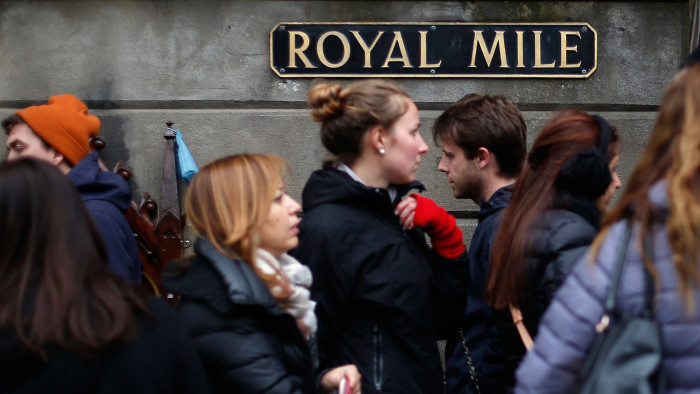Scots have revived the majesty of democracy

Roula Khalaf, Editor of the FT, selects her favourite stories in this weekly newsletter.
An Israeli friend and I were awaiting returns of the Scottish referendum in an Amsterdam bar last night, when he remarked: “I never used to believe in deliberative democracy. Look at the Scots. Now I do.”
Whatever else the referendum meant for participants – a grinding disappointment for the Yes campaign, euphoric relief for the No – for those who could only watch from bars in foreign countries, it aroused deep emotions about democracy. Here was a people deliberating together, figuring out its collective destiny, making a choice it knew was historic. Popular sovereignty recovered its majesty.

The A-List provides timely, insightful comment on the topics that matter, from globally renowned leaders, policy makers and commentators
Scotland made this bystander remember all the places in the world where such possibilities of deliberation have been shut down: by the Anschluss in Crimea, by the bloodshed that now makes free democratic choice in eastern Ukraine so unlikely; and in Tibet, where there is no chance of free choice, not now, not ever.
So at a time when disillusion with liberal democracy is endemic in many a country lucky enough to be one, it was a night when 16-year-old Scots, voting for the first time, reminded us once again why the exercise of public freedom is a good beyond price. In a world where authoritarian capitalism is consolidating itself from Shanghai to the Polish border, from Murmansk to Afghanistan, it was good to see how a people comes alive when given the chance to exercise both the private freedoms of capitalist consumption and the public freedoms of democratic life.
It was also a good night for another idea: the idea that democratic life is about living in and through deep difference, that a United Kingdom deserves to survive into the future because it allows intense and distinct national traditions to share democratic space.
The referendum result would have been much closer if fear had been the only factor holding the union together. In fact, the mystic chords of memory still held tight – the sense that Scots and English, Welsh and Irish had fought together and sometimes died for the same freedoms.
More deeply, the No campaign prevailed because it tapped into an implicit recognition about the symbiotic interdependence of Scottish and British identity: the understanding that each nation in the union defined itself in relation to each other, that their identities were made in the mirror of the other’s mocking, scornful but brotherly and sisterly gaze, and that to lose the union would have been to lose the mirror in which Scottishness acquires its defining contrast.
Somehow, after deep deliberation, a majority of Scots understood that their Scottishness still needs the union.
The writer, formerly a Canadian politician, teaches at the Harvard Kennedy School
Comments